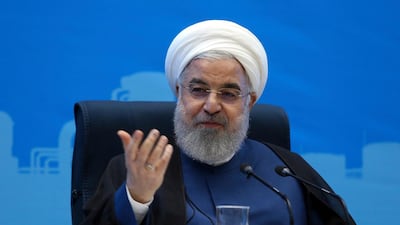Iran’s president says the country is ready to talk to the United States if Washington lifts its economic penalties on Tehran.
“The moment you stop sanctions and bullying, we are ready to negotiate,” Hassan Rouhani’s official website quoted him as saying on Sunday.
Regional tensions have spiked a year after the Trump administration unilaterally withdrew from Iran’s nuclear deal with world powers. The US has since reimposed harsh sanctions on Tehran’s oil exports, exacerbating an economic crisis that sent its currency plummeting.
It has been claimed that America’s decision to pull out of the deal was made by President Donald Trump to spite predecessor Barack Obama.
The UK's Mail on Sunday published a leaked memo from the former British ambassador to the US, Kim Darroch, in which he made the assessment that Trump's decision to abandon the international accord was "an act of diplomatic vandalism, seemingly for ideological and personality reasons" because the pact "was Obama's deal".
Mr Darroch announced his resignation last Wednesday after other leaked memos showed he had described the Trump administration as dysfunctional and inept.
Earlier on Sunday, the leaders of Britain, France and Germany called for an end to “the escalation of tensions” in the Middle East.
A joint statement, published after French President Emmanuel Macron hosted German Chancellor Angela Merkel and senior British cabinet minister David Lidington at the Bastille Day parade in Paris, expressed concern that the 2015 deal over Iran’s nuclear programme could unravel further. It also said it was up to Tehran to ensure the agreement survived.
London, Paris and Berlin urged all sides to consider the consequences of their actions.
“We believe the time has come to act responsibly and seek a path to stop the escalation of tensions and resume dialogue,” the statement said.
“The risks are such that it is necessary for all stakeholders to pause and consider the possible consequences of their actions.”
Britain also said it would support the release of an Iranian tanker that Royal Marines stopped near Gibraltar if Iran could guarantee the vessel would not breach European sanctions on oil shipments to Syria.
In apparent retaliation for the seized ship, Iranian paramilitary vessels tried to impede the passage of a British oil tanker through the Strait of Hormuz, only turning away after receiving “verbal warnings” from a British navy vessel accompanying the ship.
The UK said on Friday it was sending a second warship to the Gulf and raising the alert level in the oil-rich region as tensions spike following the threat.
Iran recently begun surpassing uranium enrichment limits set in the 2015 deal but says these moves can be reversed if it is given strong enough economic incentives to offset US sanctions.

